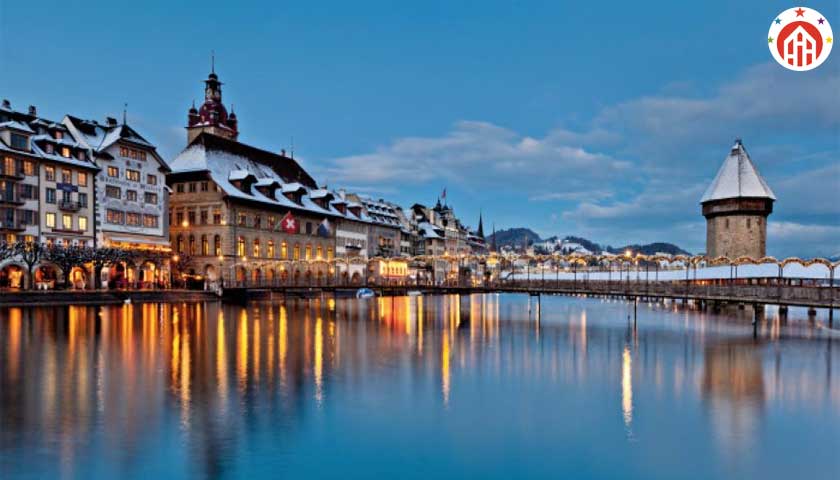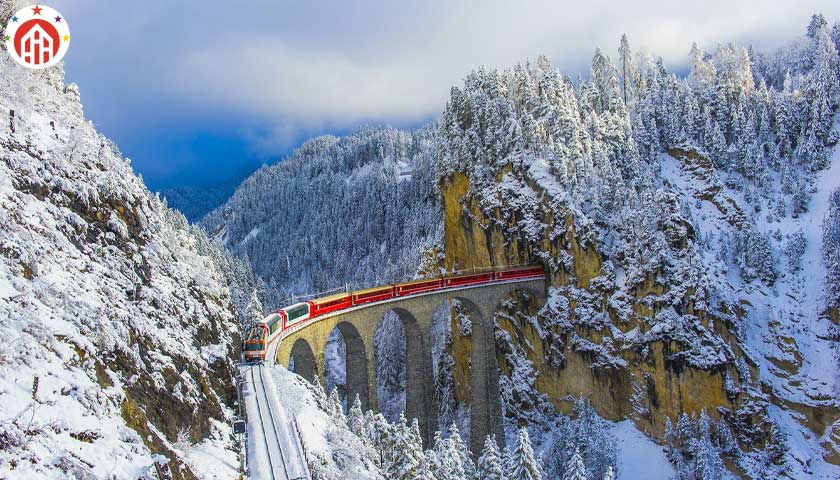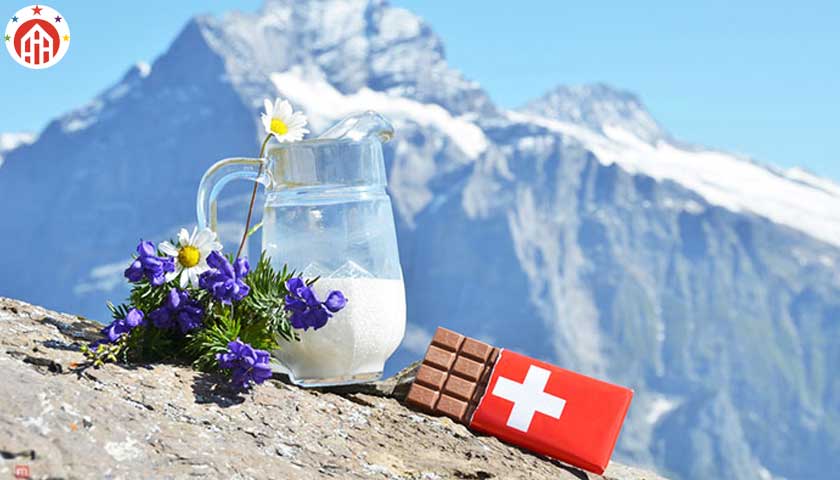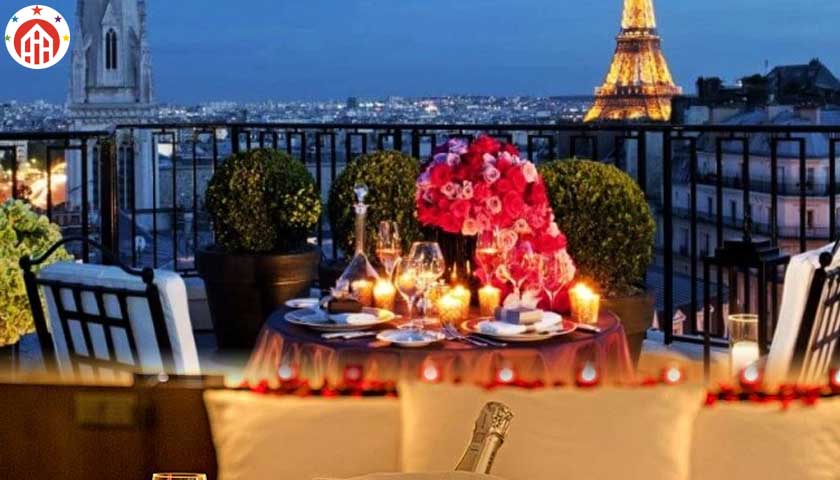Switzerland: Mistakes Many Travelers Make
Switzerland is a tiny country of some 7.7 million people surrounded by four far-larger neighbours: France, Germany, Italy and Austria. Yet despite its small size, it seems everyone has an opinion about what life is like in Switzerland. For some the mountainous country is a beautiful, pristine paradise. For others it’s uptight, conservative and downright boring.
Switzerland is most famous for its mountains, cheese, chocolate, cows, and watches. Of course these things are part of everyday life: check out the mouth-watering display of chocolate bars at any grocery store. But the Swiss and their country are far more complex.
There are three common, expensive pitfalls when traveling Switzerland.
1) Transportation; Switzerland has the most dense train network in the world and the trains are Japanese-style punctual.
Many of the mountain sites we wanted to visit were only accessible by very expensive cable cars. But the first class Swiss Train Pass includes most cable cars, with 50% discounts on the remaining ones.
2) Food; Swiss food is make-you-cry expensive, but there’s a delightful way to save a ton of money. Most hotels include your breakfast, and for lunch you need look no further than the ubiquitous Migros Supermarket, which is like the Swiss version of Trader Joe’s. Migros is a GREAT place to buy tasty, cheap sandwiches or take-out food, and your daily picnic lunches were a beloved ritual on this trip. The Coop also offers a similar To Go menu, and you’ll find either a Migros or a Coop in every train station.
3) Deciding Where To Visit; Here are some places to visit in Switzerland you have to see to experience the best of Switzlerland’s tourism.
Matterhorn, Zermatt
This pyramid shaped giant is arguably the most photographed mountain in the world and therefore, also Switzerland’s most famous Alpine peak and a top place to visit in Switzerland.
Chateau de Chillon, Montreux
Located in the heart of the Swiss Riviera on the banks of Lake Geneva is Chillon Castle – the four-century old water fortress that served as the seat of the wealthy Counts of Savoy. Stroll by the lakeside or parade through its ancient halls where 14th century paintings, towers, subterranean vaults, bedrooms, weaponry and furniture have been kept preserved in their original form.
The Jungfrau Region
The Jungfraujoch is an Alpine wonderland that has much to offer adventurers and those seeking a quieter retreat. The ‘big three’ – glacial monoliths Jungfrau, Monch, and Eiger – tower over rolling green meadows and winding mountain paths, making for truly enchanting views that embody the best of Swiss tourism.
Swiss National Park, Zernez
Switzerland’s only national park is a spectacle not to be overlooked. A throwback to how the Alps was before it was touched by tourism, the Schweizerischer Nationalpark features 172 square kilometres of unspoilt scenery from snow-encrusted glaciers, verdant pastures, waterfalls and lush woodlands, making it a top place to see in Switzerland.
Lake Geneva and surrounding cities
Hugged by Geneva on the west and Lausanne on the east is Lake Geneva, a giant liquid basin that has been aptly called by the Celts ‘Lem an’ or ‘Large Water’. It’s now referred to as Lac Léman by the French-speaking Swiss who reside in the area, and the 582 square kilometre-lake is dotted with luxurious fairy-tale chateaus on its shores and stretches of hillside vineyards rise from the lake, giving a rare glimpse into the world of Swiss wines. Ferries, paddle streamers and boats paddle through its topaz waters daily.
Lugano
Travelling to Lugano shows Switzerland in a different light. Bordering Italy in the south, the Italian influence is undeniable in the Ticino region, from the local language, romantic villas and rich cuisine up to the warm summers. Although a landlocked country, the weather in southern Switzerland is tinged by rushes of warm Mediterranean air. Lugano is flush with museums and a number of heritage sites housed in neoclassical palazzos (grand buildings).
Bern
Not many people know that the medieval city of Bern is Switzerland’s capital – but once you step on its narrow cobblestoned streets, all doubts are sure to vanish. History sings in every corner of this city, especially in its Old Town, which has been named a UNESCO World Heritage Site. Archaic towers loom over Bern’s sandstone facades, numerous fountains and entrenchments while arcades are filled with boutiques, bars, cafes and cabaret stages that are sometimes hidden within vaulted cellars.
Lucerne
In the heart of Switzerland lies the lakeside city of Lucerne, another postcard-perfect town nestled among a mountainous panorama. Fortified towers, wooden bridges and timeworn churches festooned with antique frescoes have allowed the city to keep its traditional townscape, adding to the charm of this top place in Switzerland. Take pleasure in the thrilling views of the city and Lake Lucerne by riding up to the peak of neighbouring Mt Pilatus, Mt Rigi or the Stanserhorn.
The Rhine Falls
The Rhine Falls, Europe’s largest waterfall, is a bewitching natural wonder of Swiss tourism. At the northernmost part of Switzerland near the town of Schaffhausen, the mighty falls roar from a breadth of more than 150 metres. Visitors can watch the spectacle from several viewing decks while those bold enough can rent their own canoes and travel to nearby castles Schloss Laufen and Schloss Wörth. On Swiss National Day, 1 August, the Rheinfall flaunts a senational firework display that attracts flocks of tourists.
Zurich
As the cultural hub of Switzerland, Zurich is not one to cross of your list of top Swiss places to see. Unbeknown to many, behind Zurich’s financial facade exists a pulsating nightlife with a contemporary edge. After all, Zurich hosts the Street Parade, one of Europe’s biggest annual rave parties.
Here are some of the most common mistakes people make on arrival.
1. Staying in the city on a Sunday. Swiss cities can be like ghost towns on Sundays. With little open, it’s far better to make like the Swiss and escape to the mountains and lakeshores to hike, swim and soak up the glorious scenery. Those who don’t tend to moan that Switzerland is boring. It isn’t – you just have to know where to go.
2. Assuming everyone speaks all Switzerland’s national languages. It may be a linguistically endowed country but it’s a mistake to think all Swiss are fluent in French, German and Italian (we’ll let them off Romansh). While many are multilingual, don’t expect to be universally understood if you speak French in the German part or German in the French part. As recent political tussles have shown, many people across Switzerland feel English is a more useful ‘second’ language than learning another Swiss national language instead.
3. Not greeting everyone personally. Don’t think you can just say a general ‘salut/gruezi’ to the room when arriving at a Swiss social occasion. No, you must greet everyone individually, either with a handshake or, if you know them already, by kissing them three times. Otherwise you’ll be thought rude.
4. Doing your washing whenever you like. Most Swiss apartments don’t have washing machines but share a communal one in the basement, and rules on when to use it can be strict. Don’t ever make the huge error of rocking up to use it on someone else’s ‘day’. Warning notes, verbal reprimands and even – as in one recent case – physical violence could ensue.
5. Paying full price on the train. The Swiss train network is remarkably good, even if it’s not always as timely as its reputation would imply. But it’s also pretty pricey. So get yourself a demi-tarif/halbtax card, now incorporated in the new Swiss Pass, and get half-price fares for a year (for a one-off fee, of course – but it’s well worth it).
6. Calling an administration office between midday and 1pm (or 2pm, or 4pm). The Swiss like to eat their lunch early, compared to some other countries. So from midday for at least an hour, don’t expect to be able to visit or call city administration offices, medical clinics or other public service offices. They’ve all gone out for the plat du jour.
7. Trying to buy lunch after 2pm. Speaking of lunch, don’t expect to easily find a restaurant that will serve you after 2pm, particularly in smaller cities and rural areas. You’ll just have to grab a sandwich (with the obligatory gherkin) from a supermarket instead.
8. Heading to your favourite cafe / restaurant / bar in August. On the subject of food, newcomers to the country might not realize that many restaurants and small shops close for (at least) a two-week holiday in the summer, a sensible move seeing as everyone else seems to be on holiday too. You may as well down tools and join them.
9. Expecting to get low-denomination banknotes out of the wall. In a country which thought a ‘basic’ income was 2,500 francs (not far off the average salary in the UK in 2014), it should be no surprise that banks don’t deal in small change. So if you withdraw 100 francs from the ATM, you’ll get a 100 franc note, not five 20s. Luckily, you don’t need to apologize for not having anything smaller when you pay for a newspaper with a 100 franc note. Swiss shop assistants just give you the change without batting an eyelid.
10. Trying to go grocery shopping on a Sunday. As we’ve already established (see point 1), there’s little open in Switzerland on Sundays, and most big grocery stores are shut. Shop opening hours vary from canton to canton, with many shutting their shop doors at 7pm during the week, too. So until plans to extend them get approved, think ahead to avoid that empty fridge on a Sunday (or hunt down a Coop Pronto in a railway station, which have extended hours).
11. Tipping in restaurants. A firmly entrenched custom in many countries, tipping is not, however, necessary in Switzerland. Staff salaries are good, compared with other countries, and tips are included in the price of your meal. You can certainly leave something if you want, but don’t feel obliged. Restaurant prices are high enough, after all.
12. Only making expat friends. A common mistake by foreigners everywhere is not to make ‘native’ friends in your adopted home and clump together with your fellow expats instead. While it can be hard to make friends with the sometimes reserved Swiss, once you do get to know them they’ll be friends for life. Join a sports club or do a language exchange to get you started.
13. Crossing the road without waiting for the green man. One habit that often bemuses expats is seeing the rule-abiding Swiss waiting obediently for the green man rather than crossing a road without ‘permission’, even if there’s no traffic coming. On the other hand, people seem to take their life in their hands on crosswalks unregulated by traffic lights. Though pedestrians have priority, don’t expect that cars will automatically stop – they often don’t.
14. Queuing. The Swiss rarely queue at bus stops, shop tills or anywhere else, for that matter. So get out of the habit quickly or you’ll just end up feeling frustrated.
Smiling. The Swiss will think you’re retarded. I have now trained myself not to smile in order to look somewhat normal. But sometimes I still can’t help it.
Showing enthusiasm when your boss says, “We’ve got a new project and we might need you to work overtime.” Don’t smile and say “great.” He will think you’re crazy. (And let’s be honest, no sane person would want to work overtime except an American.)
Not knowing that without your permit, you can do nothing. You can’t get a phone (except for a pre-pay cell), you can’t travel outside the country, and you can’t do much of anything else. Except wait.
Decorating your office space with photos and personal items. The Swiss prefer white walls in the office and keep their personal lives separate from work.
Not realizing that when a Swiss criticizes the way you do laundry or gardening, that this is just their way of being friendly and saying hello.
Standing in line. There is no such concept, despite misconceptions that everything in this country is organized to the 10th of a second. The only people who stand in line are expats.
Not getting that sandwich right at noon. There might not be any left at 12.30 p.m. And all a Swiss colleague will say to you is, “you should have been more on time.”
Opening the window on a Swiss train. It doesn’t matter how hot it is. Most Swiss hate drafts and will prefer to sweat.
Not introducing yourself to a Swiss first. Most Swiss people generally will not come to you.
Not being patient. Everything in Switzerland takes forever. Getting paid by the unemployment people. Making friends. Getting your permit.
Asking for butter. They just don’t use that stuff on bread here. And if you do manage to ask for some, you’ll be charged for it.
Every country has its culture and its quirks and when you start living in a new one, you realize just how different things are. Above are some “mistakes” We’ve made as an foreigner living in Switzerland. Maybe you can relate.




